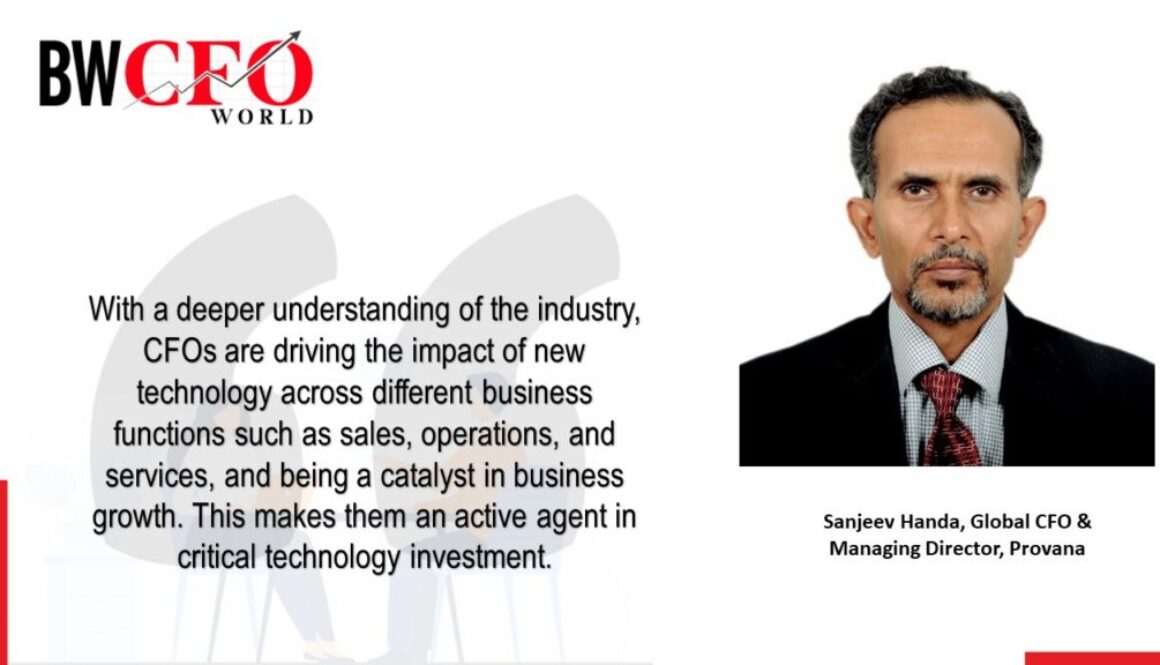Decoding The Modern CFO Of The Tech Industry
Contributed by: Sanjeev Handa, Global CFO & Managing Director, Provana
Twenty-first-century CFOs are facing unprecedented levels of risk and disruptive innovation. As business partners to the CEO, they must become forward thinkers, excellent communicators, and successful connectors.
Organisations are undergoing a tremendous transformation journey. As market conditions, consumer demands and technologies evolve, so do the roles and responsibilities of business leaders. The pandemic has altered the modus operandi for businesses, causing major shifts at the C-suite level. And for the technology industry, transformation is a constant. For example, AI-powered collections and call centres are completely shifting the customer service paradigm. And a sector that evolves constantly, requires a system that can provide agility and scalability, and a CFO who will be the driving force behind this transformation.
Today, finance leaders play a partnership role and nowhere is this truer than the technology industry, where investing in the right kind of solution is crucial for an enterprise’s success. A CFO, who was previously limited to accounting, is now given the time to understand which technologies are worth investing in, based on how they align with the strategic objectives set by the CEO and how the investment will impact the P&L of the different businesses within the organisation. With a deeper understanding of the industry, CFOs are driving the impact of new technology across different business functions such as sales, operations, and services, and being a catalyst in business growth making them an active agent in critical technology investment.
Transition To Strategic Business Adviser
Part of the CFO’s new responsibility is to provide CEOs and the board of directors with actionable insights, direction, and recommendations on a range of issues that may affect financial performance. The transition to strategic business adviser necessitates a new set of skills and tools, as CFOs must now consider non-financial elements and other influences that may impact the company’s future performance and earnings. Let’s take an example here. The reshuffling of the market structure due to the impact of the pandemic on supply chains and government policies led to more M&A opportunities or one-off investments that businesses would not have otherwise considered. As a result, there are more projects that the finance team needs to handle. So how does the role of the CFO change in the case of M&As ?
Consider this – there is a new, compelling target company and acquiring it could be highly advantageous from a competitive standpoint. However, when considering the numbers, the data tell us that margin and profitability would be negatively impacted. This, exactly, is where the CFO would step in, do an accretion/dilution analysis, and make an informed decision on how to proceed –whereby the CFO would decide if the M&A deal is a valuable one with long-term growth prospects.
Leading With Clear Communication
Another enhanced and reformed aspect of the role of a modern CFO is ensuring effective and transparent communication within the team. Often, a finance leader is seen as someone who loves to say “no” to funding requests. While that may be the right answer in many scenarios, it is vital to let your team know why. Finance leaders who have a firm grasp on the company’s business capabilities and strategic outlook are better suited to say no while offering a better alternative that will likely achieve both financial and business objectives. Offering that additional insight rationale is key to building a culture of trust, ownership, accountability, collaboration and innovation, and that goes a long way in eliminating stress in an otherwise demanding and deadline-oriented work environment.
Shaping The Office Of The Future
In the technology sector, CFOs are stronger in forecasting future needs by making/supporting technology investment decisions that will drive enterprise-wide transformation. As we move forward, it becomes even more important for CFOs to play an active role in shaping the post-pandemic office and working with other functions within the organization like HR, Technology, etc., to decide which remote working model will best meet the organization’s cultural and financial needs and what it will take to make the workplace feel secure to employees.
Twenty-first-century CFOs are facing unprecedented levels of risk and disruptive innovation. As business partners to the CEO, they must become forward thinkers, excellent communicators, and successful connectors. Given the ever-changing business climate, we operate in, the CFO of today and the future is of strategic importance to a company. From finding a new equilibrium for business while navigating through disruptions and technology upgrades, the CFO not only has the opportunity but also the responsibility to drive decision-making beyond the traditional realm of finance and accounting.
The content published in this article is the author’s personal opinion.

